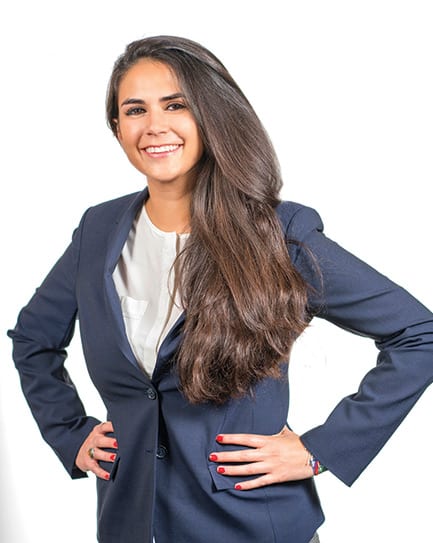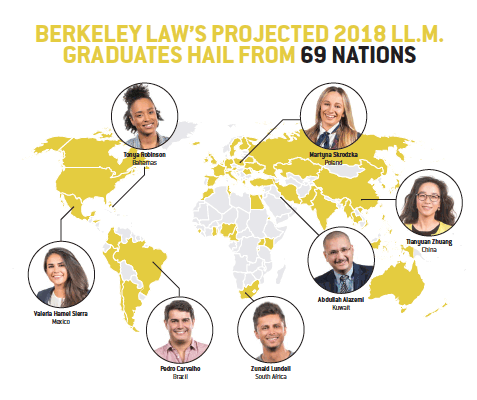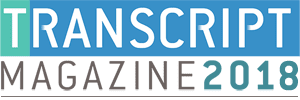
With its highest enrollment ever, Berkeley Law's surging LL.M. Program attracts lawyers from around the world.
By Andrew Faught.
From his home office in Paris, international arbitration practitioner Georgios Andriotis plans to change the world. Thanks to Berkeley Law’s new LL.M. hybrid option program, he’s getting closer every day—even though he’s 5,500 miles away from his professors and classmates.
“A Berkeley Law degree is a tool for change, both locally and globally,” says Andriotis, one of 13 international students taking part in the new effort, which launched in January. Students can earn the master’s-level degree after completing four online courses and spending a summer semester in Berkeley—providing welcome flexibility to international students with established careers and families.
Andriotis plans to use his degree to help develop a “strategic vision” concerning the way law operates within the U.S. and other legal systems. Gaining the necessary skills to handle international disputes, he hopes to “narrow the socio-legal distance” among the various actors in today’s international arbitration system.
The new hybrid option joins three other LL.M. degree program tracks: traditional (a nine-month course of study in Berkeley); professional (offered during two consecutive summers); and a thesis track. With the four offerings, Berkeley now counts more than 400 LL.M. students—its highest enrollment to date.
Many students join the program to learn the rudiments of the American common law legal system, which underpins global commerce. Most countries spanning the globe have legal traditions that instead are rooted in civil law.
Dean Erwin Chemerinsky says the various tracks are an integral part of the Berkeley Law experience.
“Our LL.M. programs allow us to educate students from across the world and hopefully have an effect in improving legal systems and the practice of law all over the globe,” he says, noting that Berkeley’s projected 2018 LL.M. graduates represent 69 countries. “The presence of our international students enriches the law school in countless ways, including the education of all of our students.”
Berkeley Law has been offering an LL.M. since 1949. LL.M. programs emerged in law schools around the country after World War II, a time when European scholars were flocking to the United States. Those hoping to study American law didn’t typically want to spend three years in a J.D. program—especially after already having practiced law or taught at a law school in their home countries, says Susan Whitman, assistant dean of academic planning and coordination.

LL.M. programs remained sparsely attended in succeeding decades, but over the past 10 years they have burgeoned with the U.S. legal system’s rise in international affairs. Around the time of the Great Recession, only 45 students were in the academic-year, traditional track; in today’s more bullish economy, that number is 233. The two-summer LL.M. professional track enrolls about 200 students.
“The more the global economy becomes interlinked, the more important it is to understand the law of a major economic engine like the United States,” Whitman says.
TWO BERKELEY SUMMERS, ONE VALUABLE DEGREE
The professional track provides a welcome option for many international lawyers who cannot leave work or personal commitments for a standard academic year. They complete courses May through August during two consecutive 10- or 13-week summer semesters.
There are challenges to the professional track, as the Trump administration’s immigration stances have affected demand for LL.M.s, Whitman adds. Britain’s Telegraph newspaper reported in March that just 4,500 Britons received a visa to study at an American college or university in 2017, the lowest figure in seven years.
For Raija-Leena Ojanen, however, the two-summer option provided a “long-wanted opportunity to make my (LL.M.) dream come true.” A former partner at Dittmar & Indrenius, a top-tier business law firm in Finland, she took on a new role this year as in-house legal adviser for the World Wildlife Fund in the Scandinavian nation.
Ojanen will return to Berkeley in May for her second summer semester. (“Going away from the family for three months is manageable,” she notes.) When she completes the program, Ojanen will hold an energy and environmental law certificate, just one example of the ways in which students can align credentials with their careers.
At the World Wildlife Fund, Ojanen’s work focuses on core conservation operations, as well as influencing public policy in the areas of biodiversity and climate change.
“LL.M studies give me a great opportunity to build networks and establish friendships with lawyers from around the world,” she says.
U.S. LAW AT A TOP U.S. LAW SCHOOL
LL.M. alumnus Benjamin Gomez ’13 chose to enroll in the traditional-track program mostly for personal reasons: after earning his J.D. in Chile, he wanted to live in California “and to be an active member of the UC Berkeley community … a place that helped shape the history of modern America.” Gaining his LL.M. proved to be more propitious than he initially realized.
“Being an LL.M. from Berkeley definitely opened a lot of doors for me,” says Gomez, an in-house lawyer for Jackson Family Wines in Sonoma County. “I specifically remember being introduced in my last couple of jobs as ‘a master’s graduate from Berkeley,’ and everyone was impressed at the fact that I was coming from one of the best law schools in the world. Still to this day, it makes me feel proud, lucky, and respected.”

Besides the master’s-level degree, students are able to earn certificates of specialization in various areas of business law and in intellectual property. They also learn to write in the U.S. legal style, with an eye toward American civil procedural rules.
“So many contracts are governed by U.S. law,” Whitman says. “To litigate for international clients, or to do corporate law for business clients, you need to understand something about U.S. law because you’re going to be working with U.S. lawyers on cases. If you’re a Chinese company and you want to expand into American markets, you need to understand American law.”
Common reasons students choose the Berkeley LL.M. program: the university’s No. 1 ranking among United States public institutions and No. 1 intellectual property law program ranking among U.S. law schools, according to U.S. News & World Report; its world-class faculty; and its proximity to Silicon Valley and Pacific Rim economies.
Berkeley Law staff members travel the globe every year to meet prospective students. Representatives go to Europe and Latin America, and there are efforts to visit Asia annually. When Director of Outreach Anya Grossmann meets with prospective students, she says many of them are surprised to learn they will get to interact extensively with faculty—a rare occurrence within legal education in many countries.
“They’re really excited to know that here at Berkeley there are office hours and you can go to coffee with professors who want to know who you are as a person,” she says. “It’s clearly something many of them are looking forward to experiencing.”
NEW ARROW IN THE QUIVER
Kara Ganter, director of communications and program development for the Advanced Degree Programs Office, helped develop the new hybrid option. She was one of two instructional designers brought to the law school in 2012, when she worked with Professor Molly Van Houweling to create an online version of her Intellectual Property course. Then, like now, the school has sought to make its offerings dynamic.
“Many of the other online programs that you see out there aren’t as engaging as the classroom experience,” Ganter says. “You watch videos, you read materials, and you don’t often interact with faculty or your classmates. We differentiate our model by offering a lot of engagement.”
The online coursework includes live and pre-recorded faculty lectures and interviews with leading practitioners and scholars on readings, along with student participation in online discussions with each other and the professor. Hybrid option students also have the opportunity to “virtually” attend a professor’s office hours to further discuss course material.
Berkeley Law’s online efforts include real-time interactions and collaborative group assignments in which students communicate by email, chat, or web conferencing.
For Andriotis, who works in one of the world’s leading arbitration practices, the hybrid option’s flexibility “means that the time I can spend away from the office and from pending cases and responsibilities is limited.”
The goal is “to make [our online] classes as rigorous, as exciting, and, in some cases, even more engaging than our in-person classrooms,” Ganter says. “I think we did that with our hybrid option. Our students are loving that we built engagement into these courses, which is different than other models of online education.”
FOUNDATIONAL, NOT TANGENTIAL
The presence of LL.M. students at the law school redounds to the benefit of all students.
Second-year J.D. student Travis Mitchell, who had never heard of the LL.M. degree before enrolling at Berkeley Law, calls LL.M. classmates “an invaluable part of my education.”
“Many of them bring unique perspectives to classroom discussions that force all students to think critically about the assumptions we make about the law and its purpose,” Mitchell says. “And because many of them already have successful legal careers in other countries, they root the class in practicality, not the legal theory that often leaves the class in a mire. They’re also a great and interesting group of people outside of the classroom.”
At some law schools, LL.M. programs are considered “somewhat of an afterthought,” says Professor Robert Merges, who teaches patent and intellectual property law. “I think the perception is that they want to really concentrate on their J.D. students, and they might see the LL.M. students as being maybe an exotic extra, but not integral to the law school. That’s not our view.”
Rare is the Berkeley Law professor who does not teach LL.M. students, and Merges says there is wholesale faculty buy-in for the program.
For Andriotis, the degree isn’t the only benefit. A visiting lecturer in international arbitration at a French university, he hopes to emulate his Berkeley LL.M. professors, who offer “cutting-edge” instruction.
“I’ll be able to apply different and more innovative methods of teaching to my students,” Andriotis says. “My experience to date has been tremendously rewarding.”




